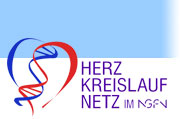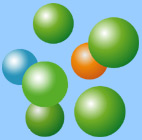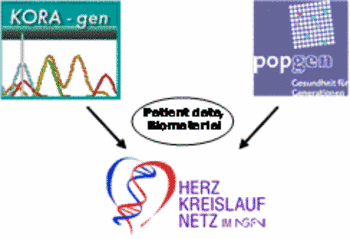 » Barrier-free View
» Barrier-free View
| ||||||||
 | ||||||||
 |
 |
 |
| Picture of the 1st Network Meeting of the Herz-Kreislauf-NetzDownloadsArchivExternal job opportunities |
 |
Population genetics of cardiovascular diseases
 |
Subproject leader
Prof. Dr. Hugo A. Katus
University of Heidelberg
Internal Medicine III / Cardiology and Pulmonary Medicine
Im Neuenheimer Feld 410
69120 Heidelberg
email: sekretariat_katus@med.uni-heidelberg.de
Phone: 06221-56 8670
The Net Project Population Genetics of Cardiovascular Diseases is a joint project of four partners which also represent the steering committee of the project: Prof. H.A. Katus, Heidelberg; PD Dr. S. Kääb, Munich; Prof. H. Schunkert, Luebeck; Prof. H.-E. Wichmann, GSF Neuherberg.
 |
Fig 1 Research on population genetics requires large cohorts of patients, controls and biomaterials. |
Cardiovascular diseases are the predominant causes of death in the western countries. They are responsible for every second case of death. Because of the decrease of infectious diseases and famines in the developing countries cardiovascular diseases will become a world wide problem in the next decades.
We all know that the well known risk factors like smoking, obesity, hypercholesterinaemia, diabetes and reduced physical activity can promote cardiovascular diseases. But the last years of research revealed that the individual genetic layout can be of major importance for the development and progress of cardiovascular diseases. It has been shown that cardiovascular diseases often accumulate in certain families.
 |
Fig. 2 Concept of the net project “Population genetics of cardiovascular diseases of Cardiovascular Diseases |
In contrast to very few monogenic diseases (e.g. familial arrhythmia syndromes and certain cardiomyopathies) most cardiovascular diseases are influenced by a large number of different genes. So it is very difficult to find single mutations or SNP`s which play a significant causal role in the genesis of cardiovascular diseases.
The search for mutations and SNP`s requires a meticulous phenotyping of all cardiovascular patients. Depending on the existence of affected relatives a detailed search for genetic causes has to be performed. Recently more and more candidate genes have been found which seem to be involved in cardiovascular diseases. New candidate genes must be identified by whole genome analyses, which is very cost- and time-consuming. If there are no affected family members one needs to perform association studies. These studies require large numbers of index patients and control individuals from the normal population to compare certain genetic markers or SNP`s between patients and the control cohort. Although all research sites have their portfolio with hundreds or thousands of more or less homogeneous patient samples. But often special phenotypes or age and gender matched subcohorts are needed. Beside this even a University hospital normally does not have access to controls from the normal population.
Against this background the net project “Population genetics has been integrated to provide the researchers with population based data and biomaterials of two large German population genetic platforms: KORA (GSF, Munich, Germany) and popgen (University of Schleswig-Holstein, Campus Kiel). These platforms have collected data and biomaterial (mainly blood / DNA) from many thousand of patients and controls. KORA is a research platform for population based health research in the fields of epidemiology, health economics and health care. KORA is based on the Augsburg center of the WHO MONICA project on trends and determinants of cardiovascular diseases which started 20 years ago. KORA includes 4 survey populations with about 18,000 participants´popgen is a relatively new population genetics platform located in Schleswig-Holstein (northern Germany). popgen intends to recruite all patients from one of 12 selected phenotypes in a precisely defined and circumscribed geografical area with a low fluctuation of the local population.”
Additionally some thousand controls from the normal population will be recruited via the local registration offices. Patients and controls will be phenotypically characterized and a blood sample will be collected to extract DNA. Selected individuals will be examined consecutively twice a year to obtain follow-up data.
In the first months of the second funding period of the NGFN the conditions for the access to popgen and KORA had to be negotiated. After the cooperation contracts have been signed by the partners the research projects in population genetics will be started. It is intended to perform at least 15 research projects using data and biomaterial of the KORA platform. The cooperation with popgen started with the recruitment of patients with coronary heart disease and continues by recruiting cardiomyopathy patients and some thousand control individuals. Recently different projects have been developed by the researchers in the Herz-Kreislauf-Netz. Presumably the first projects can be started in late summer 2005. KORA recently started to build up a web-based platform named KORA-gen to give a in depth view to the large number of studies, data and biomaterials collected in KORA-gen.
The large scale access to population based data and biomaterial must continue and has to be optimized. Population based analyses are supposed to bring major progresses into the research on the genetic causes and pathways of cardiovascular diseases. Additional studies must be performed to enlarge the data and biomaterial portfolio of the population platforms. It could be an advantage to integrate additional, may be also international platforms and data as well as biomaterial bases into the net project. It is also very important to bring the data which will be collected from the single projects back into the data base. So the Herz-Kreislauf-Netz can gain maximum benefit from this project to identify candidate genes and to develop new diagnostic and therapeutic techniques in the near future. In this context the disease focused networks cooperate with the technology transfer unit of the NGFN (KTT NGFN, Ascenion GmbH, Munich, Germany).
In coordination with Prof. Dr. Schunkert, University of Schleswig-Holstein, Campus Lübeck and PD Dr. Kääb, Medical Clinic I, Ludwig-Maximilian-University München.
more information about the working group:
http://www.med.uni-heidelberg.de/med/med3/index.html